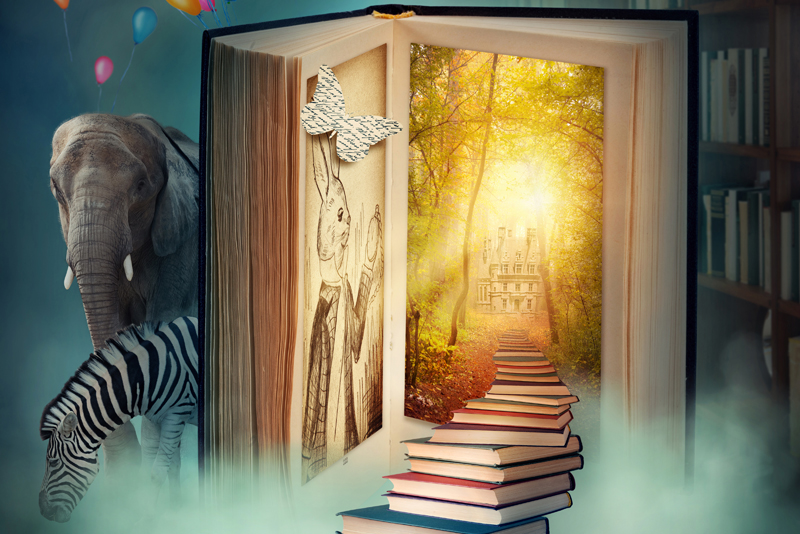Magic in Fantasy Books

One of the key elements which sets Fantasy books apart from the rest of the Alternative Fiction is the use of metaphysical energy – also known as magic. This magic can be expressed verbally in spoken word, verse or song and is often empowered by the use of Latin or Enochian translations. It can be disbursed through objects such as wands and brooms. It can be stored inside stones, cauldrons, and boxes. Metaphysical energy can be used to prosper the protagonist or antagonize the antagonist. Magic can be wielded by humans and non-humans alike. It is a useful vehicle in quest novels when normal step-by-step travel might seem to drag the pace of the story. At its heart, the magic within a fantasy book pushes readers just beyond the realm of mundane ordinariness and allows them a glimpse of what might be. And isn’t that why we read them?
The spectrum of metaphysical energy as presented in fantasy books ranges from simple Latin translations of words and a swish of a wand to intense ancient ceremonies that are written with the intention of instruction rather than just pure entertainment. It has its roots in our shared cultural histories – in our religions and legends and myths and dreams. So the magical notes of fantasy books strike a universal chord within readers, drawing the readers from the comfort of reality into the familiarity of fantasy. It’s appealing. It’s exciting. It’s what we were raised to believe in – tooth fairies and Santa Claus and the Easter Bunny and magic slippers and talking mirrors and flying carpets – before we were told to grow up.
Energy cannot be created or destroyed. Physical energy is that which can be observed and proven and recorded. Metaphysical energy is also provable, observable and recordable; it just happens to take place beyond the physical realm: the Law of Attraction, prayer, and faith healing are examples of this. So where should the reader draw the line between non-fiction and fiction, between science fiction and fantasy? The line is drawn by the purpose the author sets for his or her audience.
Fantasy is fiction written incorporating metaphysical energy and events with the purpose to entertain. It can also be used to instruct, initiate, romanticize, promote and/or condemn the use of metaphysical energy. But at its heart, fantasy uses magic to carry the plot forward and entertain the reader.
And yet, by taking the reader beyond the realms of boring, mature, real life; it magically helps the reader transform into better than boring, wiser than mature, and reincarnating reality. The child who stood before the mirror and whispered the age-old question with the belief that the mirror might answer, can and often does become the adult who looks into the mirror and smiles with confidence, ready to face the world.
The spectrum of metaphysical energy as presented in fantasy books ranges from simple Latin translations of words and a swish of a wand to intense ancient ceremonies that are written with the intention of instruction rather than just pure entertainment. It has its roots in our shared cultural histories – in our religions and legends and myths and dreams. So the magical notes of fantasy books strike a universal chord within readers, drawing the readers from the comfort of reality into the familiarity of fantasy. It’s appealing. It’s exciting. It’s what we were raised to believe in – tooth fairies and Santa Claus and the Easter Bunny and magic slippers and talking mirrors and flying carpets – before we were told to grow up.
Energy cannot be created or destroyed. Physical energy is that which can be observed and proven and recorded. Metaphysical energy is also provable, observable and recordable; it just happens to take place beyond the physical realm: the Law of Attraction, prayer, and faith healing are examples of this. So where should the reader draw the line between non-fiction and fiction, between science fiction and fantasy? The line is drawn by the purpose the author sets for his or her audience.
Fantasy is fiction written incorporating metaphysical energy and events with the purpose to entertain. It can also be used to instruct, initiate, romanticize, promote and/or condemn the use of metaphysical energy. But at its heart, fantasy uses magic to carry the plot forward and entertain the reader.
And yet, by taking the reader beyond the realms of boring, mature, real life; it magically helps the reader transform into better than boring, wiser than mature, and reincarnating reality. The child who stood before the mirror and whispered the age-old question with the belief that the mirror might answer, can and often does become the adult who looks into the mirror and smiles with confidence, ready to face the world.
You Should Also Read:
Perky's Books & Gifts Discussion Guide
Gilda Joyce Book Review
Cosplay

Related Articles
Editor's Picks Articles
Top Ten Articles
Previous Features
Site Map
Content copyright © 2023 by Evelyn Rainey. All rights reserved.
This content was written by Evelyn Rainey. If you wish to use this content in any manner, you need written permission. Contact Evelyn Rainey for details.



